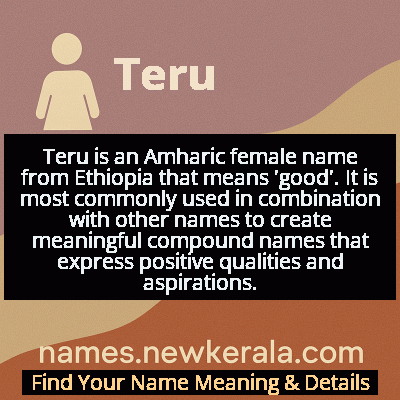Teru Name Meaning & Details
Origin, Popularity, Numerology Analysis & Name Meaning of Teru
Discover the origin, meaning, and cultural significance of the name TERU. Delve into its historical roots and explore the lasting impact it has had on communities and traditions.
Name
Teru
Gender
Female
Origin
African
Lucky Number
1
Meaning of the Name - Teru
Teru is an Amharic female name from Ethiopia that means 'good'. It is most commonly used in combination with other names to create meaningful compound names that express positive qualities and aspirations.
Teru - Complete Numerology Analysis
Your Numerology Number
Based on Pythagorean Numerology System
Ruling Planet
Sun
Positive Nature
Leaders, ambitious, highly driven, self-reliant, innovative.
Negative Traits
Overly aggressive, domineering, impatient, selfish.
Lucky Colours
Red, orange, gold.
Lucky Days
Sunday.
Lucky Stones
Ruby, garnet.
Harmony Numbers
2, 3, 9.
Best Suited Professions
Entrepreneurs, managers, engineers.
What People Like About You
Courage, determination, leadership.
Famous People Named Teru
Teruworq Gebre
Cultural Preservationist
Founded the Ethiopian Women's Heritage Foundation to preserve traditional crafts
Teru Mekonnen
Educator
Established rural education programs for girls in the Amhara region
Teru Alemu
Musician
Popular traditional Ethiopian singer known for modern interpretations of folk music
Name Variations & International Equivalents
Click on blue names to explore their detailed meanings. Gray names with will be available soon.
Cultural & Historical Significance
Historically, names incorporating 'Teru' have been used for centuries in Ethiopia, often given to express parental hopes for their child's character and future. The practice of combining 'Teru' with other meaningful elements (like 'worq' for gold) creates names that serve as blessings and aspirations. This naming convention reflects the poetic nature of Amharic language and the importance of meaningful nomenclature in Ethiopian cultural identity, where names often carry stories, values, and family heritage.
Extended Personality Analysis
Individuals named Teru are often perceived as embodying the positive qualities suggested by their name's meaning. They tend to be characterized by a strong moral compass, kindness, and a genuine desire to do good in their communities. These individuals often display nurturing qualities, showing compassion and empathy toward others while maintaining a sense of integrity and ethical responsibility in their actions.
Beyond their inherent goodness, Terus typically demonstrate resilience and practical wisdom. They approach challenges with optimism and a solution-oriented mindset, often serving as peacemakers in difficult situations. Their combination of moral strength and emotional intelligence makes them trusted confidants and natural leaders who inspire others through their consistent demonstration of positive values and reliable character.
Modern Usage & Popularity
In contemporary times, Teru continues to be used primarily within Ethiopian and Ethiopian diaspora communities, though its usage patterns have evolved. While traditionally used almost exclusively in compound names, there is a growing trend of using Teru as a standalone given name, particularly among younger generations and urban populations. The name maintains its cultural significance while adapting to modern naming conventions. Its popularity remains stable within Ethiopian communities, with occasional use by parents from other backgrounds who appreciate its positive meaning and cultural richness. Social media and global connectivity have also contributed to wider recognition of the name beyond traditional Ethiopian circles.
Symbolic & Spiritual Meanings
Symbolically, Teru represents the universal human aspiration toward goodness, virtue, and moral excellence. Beyond its literal meaning, the name embodies concepts of purity of heart, ethical conduct, and the positive impact one can have on their community. In Ethiopian cultural context, it symbolizes the hope that an individual will contribute positively to society and uphold traditional values of integrity and compassion. The name also carries metaphorical significance as a beacon of light in darkness, representing the idea that goodness can illuminate and transform circumstances, relationships, and communities through consistent moral action and positive influence.

